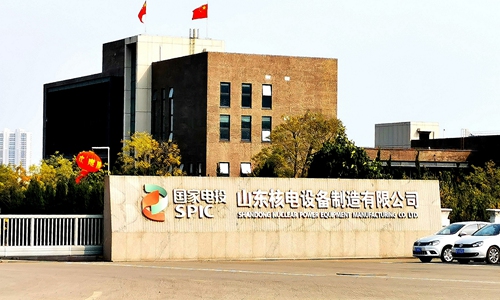
Photo: VCG
Haiyang in East China's Shandong Province has become the country's first city that is heated by a nuclear power plant, an environmentally friendly way.
After a few days of trial operation, the nuclear plant with two reactors began heating 700,000 square meters of homes this winter and is expected to cater to the entire Haiyang city by 2021, State Power Investment Corporation announced on Friday.
With more reactors in the pipeline, the power plant would be able to heat as much as 200 million square meters of homes in an area encompassing a diameter of 200 kilometers, saving 6.6 million tons of coal each year.
The project in its current scale can save 23,200 tons of coal each year, reducing smoke and dust emission by 222 tons, besides cutting 382 tons of sulfur dioxide, 362 tons of nitrogen oxides, and 60,000 tons of carbon dioxides. The amount equals emission of six 10-ton boilers, Shanghai-based news outlet The Paper reported.
The heating system, which is isolated from the nuclear circuit but can make use of wasted energy, is safe and environmentally friendly, analysts said.
The heating system uses non-radioactive vapor from the nuclear plant system to warm water in the city's centralized heating systems. Through this, the reactor and households are separated and only the heat is conveyed to residences , The Paper quoted the company as saying.
The vapor comes from two reactors of a nuclear power plant in the city, which went into full commercial operations in 2018 and January 2019, respectively. http://news.bjx.com.cn/html/20191105/1018632.shtml
The world's first nuclear heating system went into operation in the 1960s in Sweden. Russia, Switzerland, and Romania have also developed such systems.
The centralized heating system in northern China depended largely on coal and natural gas, which caused the problem of smog. Nuclear heating came up as the choice to address this problem and optimize the country's energy structure, which was nailed down in 2017 by 10 departments including the Ministry of Ecology and Environment (previously Ministry of Environment Protection).
North China's Hebei Province and Northeast China's Jilin Province are also considering a similar nuclear heating system.



